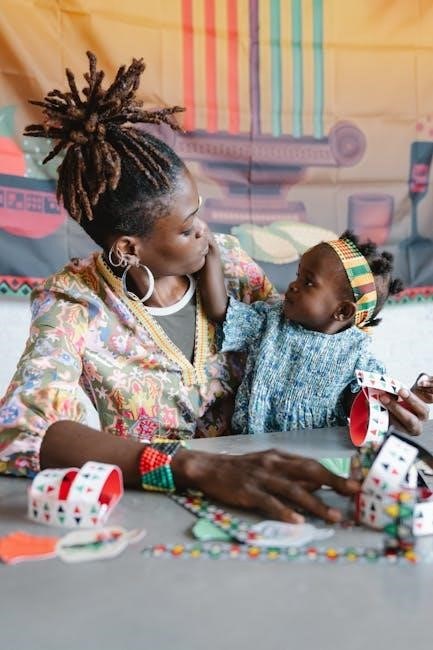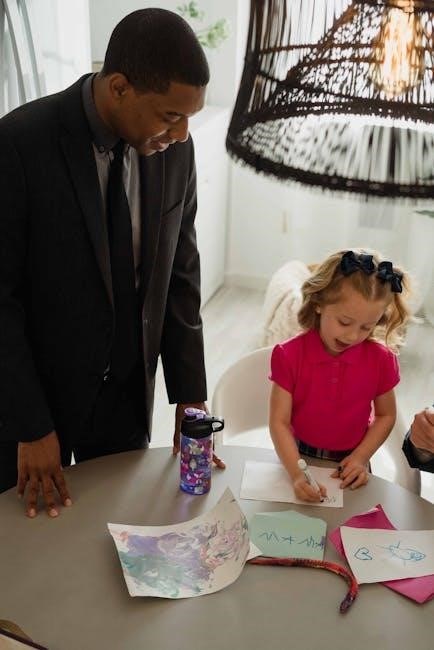This section introduces the Love Flops Parents Guide, a resource to help assess the show’s suitability for children․ It covers age ratings, content, and themes, emphasizing the importance of parental guidance to address sensitive topics and character relationships․
1․1 Overview of the Series
Love Flops is an original Japanese anime television series produced by Kadokawa Corporation, animated by Passione, and directed by Nobuyoshi Nagayama․ The series follows Asahi Kashiwagi, a high school student whose life takes a dramatic turn when a TV fortune-teller’s predictions come true․ On his way to school, he encounters five girls—Aoi Izumisawa, Bai Mongfa, Karin Istel, Amelia Irving, and Ilya Ilyukhin—who confess their love to him on the same day․ This sets off a chain of events that intertwines his life with theirs in unexpected ways․ The anime blends elements of romantic comedy, ecchi, and harem genres, with a mix of light-hearted and emotionally charged moments․ While it initially appears as a standard ecchi harem series, it gradually explores deeper themes and complexities, making it a unique take on the genre․
1․2 Importance of Parental Guidance
Parental guidance is crucial when considering Love Flops for younger audiences due to its mature themes and content․ The series includes mild nudity, ecchi elements, and suggestive dialogue, which may not be suitable for all age groups․ Additionally, the show touches on complex emotional and relational dynamics, such as multiple romantic confessions and character interactions that could raise questions for teens․ Parents are encouraged to review the content to ensure it aligns with their values and standards․ Open discussions about the themes and situations portrayed can help teens understand the implications and make informed decisions․ This guide aims to provide a clear understanding of the series’ content, enabling parents to make thoughtful choices about their children’s viewing experiences․

Age Rating and Content warnings

Age Rating and Content Warnings
Love Flops is generally recommended for audiences aged 13 and above due to mild ecchi elements and romantic comedy themes, including some suggestive content․
2․1 Understanding the Age Rating System
The age rating system for Love Flops helps parents determine its suitability for younger audiences․ The series typically falls under a Teen rating (13+) due to its blend of romantic comedy and mild ecchi elements․ The rating system considers factors like dialogue, themes, and visual content to ensure it aligns with viewer maturity levels․ While the anime avoids extreme explicit content, it includes suggestive humor and some fan service, which may not be appropriate for younger children․ Parents should review the content to decide if it matches their child’s sensitivity and understanding․ This system acts as a guide to help families make informed viewing choices․
2․2 Content Warnings for Parents
Love Flops contains several elements that may require parental discretion․ The series includes mild fan service, suggestive humor, and romantic themes that could be inappropriate for younger audiences․ While the ecchi elements are not overly explicit, they may still make some parents uncomfortable․ Additionally, the harem genre and multiple romantic relationships depicted in the show might raise questions about healthy relationships and boundaries․ Some scenes feature emotional drama and character conflicts, which could be intense for sensitive viewers․ Parents should be aware of these aspects before allowing their teens to watch, as they may prompt discussions about appropriateness and maturity․ The show’s lighthearted tone balances these elements, but caution is advised based on individual child sensitivity․

Themes in Love Flops
Love Flops explores themes of romantic comedy, ecchi, and emotional drama, blending lighthearted humor with character relationships and personal growth, appealing to fans of harem genres․
3․1 Romantic Comedy Elements
The series Love Flops heavily incorporates romantic comedy elements, blending lighthearted humor with heartfelt moments․ The protagonist, Asahi Kashiwagi, navigates a whirlwind of relationships and comedic misadventures, creating an engaging and entertaining narrative․ The show’s humor often stems from awkward situations, misunderstandings, and the protagonist’s clumsy yet endearing interactions with the female characters․ These elements make the series relatable and enjoyable for viewers who appreciate lighthearted romance․ However, parents should be aware that while the comedy is playful, some situations may involve mild innuendos or suggestive dialogue․ The romantic comedy aspect is central to the show’s appeal, offering a balance of humor and character development that fans of the genre typically enjoy․
3․2 Ecchi and Harem Themes
Love Flops incorporates elements of the ecchi and harem genres, which may concern parents․ Ecchi themes include suggestive humor, fan service, and mildly risqué scenes, while the harem aspect focuses on the protagonist being surrounded by multiple romantic interests․ These elements are common in the genre but may not align with all family values․ Parents should be aware of the show’s occasional focus on visual fan service and romantic rivalry․ While the series is primarily comedic, these themes could prompt discussions about appropriateness and boundaries․ Viewing with teens can help address any questions or concerns, ensuring they understand the context and intentions behind such content․
3․3 Emotional and Dramatic Themes
Love Flops balances humor with emotional depth, exploring themes like unrequited love, self-discovery, and relationship dynamics․ While the series is primarily lighthearted, it delves into moments of vulnerability and character growth․ Teens may relate to the protagonist’s struggles with emotions and the challenges of navigating complex relationships․ Parents should be aware of scenes that depict heartbreak, jealousy, and personal insecurities, which are portrayed realistically․ These elements can spark conversations about emotional intelligence, empathy, and healthy relationship habits․ The show’s dramatic moments are not overly intense but still provide opportunities for parents to discuss emotional resilience and decision-making with their teens․

Character Analysis for Parents
Love Flops features a cast of vibrant characters, including the relatable protagonist Asahi and a diverse group of female leads, each with unique personalities and roles․
4․1 Main Character: Asahi Kashiwagi
Asahi Kashiwagi is the main character of Love Flops, a high school student whose life takes a dramatic turn when he becomes entangled in a series of romantic misadventures․ His personality is marked by kindness, humor, and a bit of awkwardness, making him relatable to teen audiences․ Asahi’s character serves as a central lens through which the story explores themes of love, friendship, and self-discovery․ Parents should note that while Asahi is generally portrayed as a well-meaning protagonist, his interactions with multiple female characters may raise questions about relationships and responsibility․ His journey offers opportunities to discuss the complexities of teenage emotions and the importance of respectful communication in relationships․
4․2 Female Characters and Their Roles
The female characters in Love Flops play pivotal roles in shaping the story and its themes․ Each character, such as Aoi, Amelia, and Irena, represents distinct personalities and cultural backgrounds, adding diversity to the narrative․ They are portrayed as confident, expressive, and influential in the life of the main character, Asahi․ While some interactions are lighthearted and comedic, others delve into deeper emotional connections․ Parents should be aware that the female characters often drive the romantic and dramatic elements of the series․ Their roles highlight themes of love, friendship, and self-discovery, which can spark discussions about relationships and emotional maturity․ The portrayal of these characters is generally positive, emphasizing individuality and resilience, though some scenes may reflect typical anime tropes common in the harem genre․
4․3 Portrayal of Relationships
The portrayal of relationships in Love Flops is central to its narrative, blending humor, romance, and emotional depth․ The series explores various dynamics, including romantic relationships, friendships, and rivalries, often with a comedic twist․ While the interactions are largely lighthearted, they occasionally touch on more serious themes like jealousy, misunderstandings, and unrequited feelings․ Parents should note that some relationships involve typical anime tropes, such as over-the-top confessions or dramatic confrontations, which may not reflect real-world relationship dynamics․ However, the series also highlights themes of mutual respect, communication, and personal growth․ The portrayal of relationships can serve as a starting point for discussions with teens about healthy interactions, boundaries, and emotional intelligence․ Overall, the show’s depiction of relationships is entertaining but should be viewed critically, especially by younger audiences․

Parental Advisory on Sensitive Topics
Love Flops contains scenes with mild nudity, suggestive humor, and occasional strong language․ Parents should review content to ensure it aligns with their child’s maturity level and values․
5․1 Nudity and Mature Content
The series Love Flops includes occasional scenes with mild nudity and suggestive content, particularly in comedic or fan-service moments․ These elements are not explicit but may still raise concerns for some parents․ For instance, characters may be depicted in revealing outfits or accidental suggestive poses, which are common in ecchi-genre anime․ While the show doesn’t cross into explicit territory, these moments are frequent enough to warrant attention․ Parents should preview episodes or discuss the content with their teens to ensure it aligns with their values․ The mature content is largely playful and intended for humor, but it’s important to gauge a child’s maturity before allowing them to watch․
5․2 Language and Dialogue
The dialogue in Love Flops is generally lighthearted and comedic, fitting its romantic comedy genre․ However, parents should be aware of occasional mild profanity, slang, or suggestive remarks that may appear in conversations․ These instances are not frequent but can still be a concern for younger audiences․ Some jokes or banter between characters may include innuendos or teasing, which are common in ecchi and harem genres․ While the language is not overly explicit, it’s important for parents to consider their child’s sensitivity to such dialogue․ Co-viewing the series with teens can provide opportunities to discuss appropriate communication and humor․ Additionally, parents may want to preview episodes to assess whether the language aligns with their family’s values and standards․

5․3 Violence and Intense Scenes
Love Flops primarily focuses on comedy and romance, with minimal violence or intense scenes․ The series occasionally features slapstick humor or exaggerated reactions, which are mild and not graphic․ These moments are often played for laughs rather than to create tension or fear․ There are no scenes depicting serious harm, gore, or prolonged conflict․ While the tone remains lighthearted, parents should note that some comedic mishaps might involve accidental collisions or over-the-top expressions of frustration․ However, these are not disturbing or emotionally charged․ The lack of intense violence makes the series relatively safe for younger audiences, though parental discretion is always advised․ Overall, the show’s emphasis on humor and relationships keeps it free from excessively violent or stressful content․

Tips for Watching Love Flops with Teens
Encourage open discussions about relationships, humor, and life lessons․ Set boundaries for viewing times and content․ Use the series to spark conversations about real-life issues and values․
6․1 Encouraging Open Discussions
Watching Love Flops with teens presents a great opportunity to engage in meaningful conversations․ Parents should encourage open discussions about the show’s themes, such as relationships, humor, and life lessons․ Ask questions like, “What do you think about how the characters handle their feelings?” or “Do you think the situations in the show are realistic?” This helps teens reflect on the content and its relevance to their own experiences․
Listen actively to their opinions and validate their feelings, even if you disagree․ Use the show as a springboard to talk about real-life issues, such as peer pressure, crushes, or decision-making․ This approach fosters trust and helps teens develop critical thinking skills while enjoying the series together․
6․2 Setting Boundaries for Viewing
Establishing clear boundaries when watching Love Flops with teens is essential for a positive viewing experience․ Parents should set time limits to ensure the show doesn’t interfere with schoolwork, extracurricular activities, or family time․ Discuss and agree on appropriate episodes or scenes to watch together, considering the content’s suitability․ For younger teens, consider skipping or fast-forwarding through mature or sensitive moments․ Additionally, create a comfortable environment where teens feel safe to pause or stop the show if they feel uncomfortable․ Setting these boundaries helps ensure the experience remains enjoyable and aligns with family values․
By maintaining control over what is watched and how it is consumed, parents can guide their teens in understanding the content responsibly․
6․3 Using the Show as a Teaching Tool
Love Flops can serve as a valuable teaching tool for parents to discuss complex themes with their teens․ The series tackles relationships, emotions, and societal expectations, providing opportunities to explore real-life issues․ Parents can use specific episodes to initiate conversations about consent, boundaries, and respect in relationships․ Additionally, the show’s comedic and dramatic elements can help teens understand the consequences of impulsive decisions and the importance of emotional intelligence; By pausing scenes or discussing character motivations, parents can guide their teens in analyzing behaviors and outcomes․ This approach fosters critical thinking and helps teens develop a deeper understanding of healthy relationships and personal responsibility․ Using Love Flops as a teaching tool can encourage meaningful dialogue and help teens navigate similar situations in their own lives․

Cultural and Social Context
Love Flops reflects Japanese anime trends, blending humor with societal norms․ It portrays high school relationships, cultural expectations, and modern teen challenges, offering insights into contemporary Japanese youth culture․
7․1 Japanese Anime Trends
Love Flops aligns with current Japanese anime trends, blending romantic comedy with ecchi and harem elements․ The series incorporates common anime tropes, such as over-the-top humor, fan service, and exaggerated character interactions․ It reflects the popularity of high school romance genres, often featuring misunderstandings, comedic misunderstandings, and dramatic twists․ The show also embraces the “harem” trope, where a single male character is surrounded by multiple female admirers, a staple in many modern anime․ Additionally, the series integrates cultural nuances, such as portrayals of Japanese high school life, making it relatable to local audiences while maintaining appeal for international viewers․ By blending these elements, Love Flops captures the essence of contemporary anime trends, offering a mix of humor, romance, and light-hearted entertainment․
7․2 Representation of Teenage Life
Love Flops portrays teenage life through a romantic comedy lens, emphasizing high school experiences, crushes, and relationships․ The series captures the excitement and chaos of adolescence, with characters navigating love, misunderstandings, and personal growth․ While exaggerated for comedic effect, the show touches on relatable themes like peer pressure, self-discovery, and the complexities of friendships․ It also highlights the emotional highs and lows of teenage relationships, often using humor to address sensitive topics․ However, the portrayal is idealized, focusing on lighthearted moments rather than darker issues like bullying or academic stress․ Parents should note that while the series reflects common teenage experiences, it does so in a fantastical and entertaining way, making it a fun yet simplified view of adolescent life․
7․3 Moral Lessons for Young Audiences
Love Flops, while primarily a comedic anime, offers subtle moral lessons for young viewers․ The series emphasizes the importance of self-awareness, responsibility, and understanding others’ feelings․ Asahi’s journey highlights learning from mistakes and growing as a person, which can resonate with teens navigating their own challenges․ The show also touches on themes of empathy, encouraging characters to see situations from different perspectives․ While the humor often takes center stage, the series subtly promotes values like honesty and kindness in relationships․ Parents can use these moments to discuss the importance of integrity and respect in daily interactions․ The series provides a lighthearted yet meaningful way to explore these lessons, making it a valuable tool for teaching young audiences about life’s complexities․

Love Flops offers a blend of humor and heartfelt moments, making it a engaging yet thought-provoking watch․ Parents should balance its entertainment value with mindful guidance to ensure a positive viewing experience for teens․
8․1 Summary of Key Points
In summarizing the key points of the Love Flops Parents Guide, it’s clear that the series balances lighthearted humor with deeper emotional themes, making it a mix of entertainment and reflection․ The age rating and content warnings highlight the need for parental discretion due to romantic comedy elements, ecchi themes, and occasional mature content․ The portrayal of relationships and character dynamics offers insights into teenage emotions and societal pressures․ Parents are encouraged to use the series as a tool for open discussions about boundaries, consent, and emotional intelligence․ While the show provides cultural context and relatable scenarios, guidance is recommended to help teens process sensitive topics․ Ultimately, Love Flops can be a valuable watch for young audiences when viewed with mindful supervision and dialogue․
8․2 Final Recommendations for Parents
Parents are advised to approach Love Flops with mindful consideration of their child’s maturity level and sensitivity․ Co-viewing the series can help gauge a teen’s reaction and provide opportunities for meaningful discussions․ Emphasize the importance of healthy relationships, consent, and emotional responsibility, as these themes are central to the narrative․ Encourage critical thinking about the portrayal of romantic and social dynamics, ensuring teens understand the difference between fantasy and real-life expectations․ Setting boundaries for viewing, such as restricting access to episodes with mature content, is also recommended․ By fostering open communication and guiding interpretation, parents can help teens derive positive lessons while navigating the show’s lighthearted yet complex elements․ Balancing entertainment with education ensures a constructive viewing experience․
